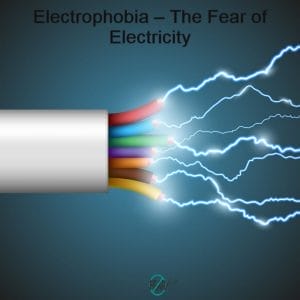Share This Article
Electrophobia: The Facts Are Shocking
Do you feel anxious or unexplainably nervous around electricity or electrically powered appliances? Does even the thought of electricity or electrical objects make your heart race? And do you find yourself obsessing over and sometimes even exaggerating the likelihood of you getting electrocuted or caught in a fire outbreak caused by electricity?
All of these are symptoms of a serious phobic condition known as electrophobia or the fear of electricity. Like many phobias, electrophobia often develops after a traumatic experience involving electricity.
Considering that the world is getting more and more technology-dependent and many of these technologies are powered by electricity, living with a fear of electricity can render you handicapped and unable to function. Luckily, it does not have to be this way and the first step towards confronting your electrophobia is by understanding where it comes from and why you are struggling with it.
What Is Electrophobia?
Electrophobia is the morbid fear of anything powered by electricity. This fear is not so unfounded considering a person can be killed by an electrical accident. However, electrophobia is a high level of apprehension even in the presence of harmless levels of electricity.

What Is the Meaning of Electrophobia?
Your mind is constantly in fear and in an exaggerated degree of worry towards anything electrical. The fear is so intense that you are a victim of constant anxiety symptoms or feelings of panic.
The difference between having a phobia and simply being cautious around electricity is in the irrational reactions and intense anxiety you have when you encounter electricity in any form. An electricity phobia leaves you feeling completely powerless and out of control while caution around electricity teaches you to control or regulate the electricity supply around you to prevent accidents.
It is a mental disorder that is triggered due to a painful experience with electricity. For example, getting shocked as a child, or losing someone you love to an electrical accident are all traumatic scenarios that can lead to a disproportionate and intense fear of electrical devices.
You now react to this trigger by avoiding anything electrically powered, including remote controls, microwaves, washing machines, vacuum cleaners, and even cell phones in some extreme cases, which leads to a reduced quality of life.
Electrophobia Symptoms
Your fear of electricity is made apparent in certain patterns of behavior or reactions. A typical electrophobic person has a flight or fight response towards electricity. This can manifest both psychologically and physically.
Physical Symptoms
- Dizziness
- Hot flashes
- Cold flashes
- Crying
- Fidgeting
- Nausea
- Tachycardia (heart rate over 100 beats per minute)
Psychological Symptoms
- Panic attacks
- Morbid anxiety even at the thought of being exposed to electricity
- Hyperventilation
- Expressing shock
- Inability to function normally
- Palpitations
- OCD
How to Treat the Fear of Electricity Phobia
You Can Help Yourself
While you cannot completely rid yourself of your phobia, there are certain things or habits you can do to reduce the intensity of your reactions towards the trigger. Bear in mind, being able to help yourself should not be a substitute for professional assistance, especially in extreme cases. And just like most mental disorders, phobias demand a great deal of self-will and mindful practice to overcome them.
The following are ways you can help yourself get through a bad phobic episode and take back your power and control.
Exercise
Getting involved in physical activities has always had positive effects on mental health. For sufferers of anxiety disorders, exercise has been shown to greatly reduce your stress level by releasing endorphins or ‘feel-good chemicals’ into the brain. Cardiovascular and aerobic exercises come highly recommended for this purpose.
Meditation
Consistent meditation brings you to a state of mindfulness and mental alertness. This helps you address your irrational fears and view them with a new perspective. It can also help by redirecting the mind from the presence of a trigger to a thought or object that makes you feel safer and less threatened drastically reducing the chances of a possible panic attack.
Breathing Exercises
Concentrating on your breathing and being mindful of slowing down and engaging the diaphragm helps take attention away from the stress and calms you. Breathing exercises are a popular coping tool for those with anxiety and have been known to be effective in relaxing the mind.
Yoga
Experts believe that practicing certain yoga positions can help relieve you of the stress that anticipatory anxiety brings. It’s also another gateway to meditation and mindful redirection.
Desensitization or Exposure Therapy
This involves confronting your fears by deliberately and gradually increasing your exposure to the thing you are afraid of. There is no rush here. Challenge yourself and gradually learn to deal with electricity as a necessary part of daily life.
Professional Help for Electrophobia
In addition to the self-help techniques covered above, professional help is recommended. Professional therapy and self-help techniques work well in tandem to help you overcome your phobia. You should seek professional assistance from a therapist, counselor, psychologist, psychiatrist or any other expert in that field who can help you dig deeper into your case and implement the proper treatment therapy.
Each victim has their own unique set of symptoms and intensity. An expert can offer a solution after carrying out the proper tests and examination. Psychotherapists usually employ the use of certain treatment methods depending on the patient. Examples of these methods are:
Cognitive Behavioral Therapy (CBT)
CBT is a treatment often used on sufferers of anxiety disorder and OCD. Since these are symptoms of electrophobia, they have proven to be helpful in dealing with electrophobia. The process helps you understand your fear at its roots. What could have triggered it, how it has manifested itself in your day-to-day life, and how best to confront it. It equips victims with appropriate tools and knowledge of their disorder to help manage it.
Medication
There are a number of potentially prescribed medications to help people deal with the symptoms of their phobia. Medications like beta-blockers, benzodiazepines, and antidepressants can be used for this purpose. Medication is only utilized in extreme cases to manage symptoms of the phobia, but does not treat the phobia itself.
Tips for Dealing with Electrophobia
Remove Caffeine from Your Diet
Caffeine is a well-known stress-inducing substance and it’s good practice to avoid it if you are suffering from a phobia. Caffeinated beverages, tea, chocolates, and even some foods should be reduced or eliminated from your diet to avoid any possible spike in your already tensed body physiology.
Be Patient
Be patient and kind to yourself in your journey towards healing. There could be episodes of relapse where you feel like you are not making any meaningful progress. You must remember to give yourself time. You are dealing with what is largely a mental disorder. It takes a lot of strength and determination.
Get Good Sleep
Don’t underestimate the direct impact that your quality of sleep has on your overall health and stress levels. Get that much-needed rest and your body and mind will thank you for it.
Listen to the Experts
Listen to and follow your professional advisor’s instructions. Be completely open with them about your symptoms, progress, or even relapse.
Your morbid fear of electricity may be your mind’s way of protecting you from a re-occurrence. Albeit exaggerated, your fear of electrical devices is not completely irrational because they do cause harm when not handled properly.
Your healing process would entail teaching your body that you are out of danger, and you no longer have to live in fear of something that could be beneficial to your quality of life.
Decide to take the right steps in freeing yourself from the grip of this fear today, because it is possible.




